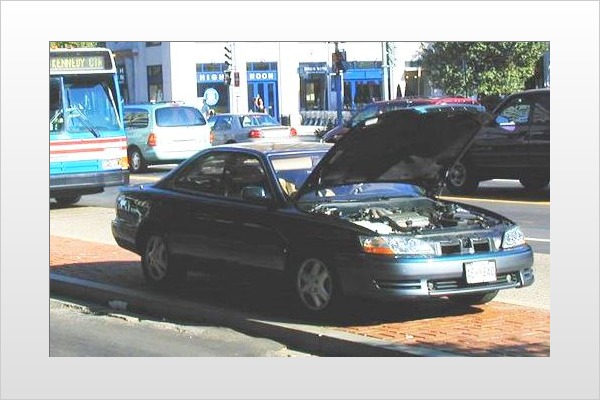
When you're broken down by the side of the road, your motor club card suddenly becomes your most precious possession. But with roadside assistance programs being pushed by credit card and cell phone companies — to name just a few recent entries to this field — how do you choose from the glut of plans available?
Before trouble strikes, it's important to choose a roadside assistance provider that meets your needs. Experts suggest weighing your options. "Be sure it covers the person, not the vehicle," says Doug McLendon, director of roadside programs for AAA, the largest auto club in the country. " based on manufacturer. Each automaker sets its own limits on how long the free service will last by mileage or age of vehicle. Some used car deals also include roadside assistance plans, but they may require a separate inspection. Generally, a tow provided through one of these plans will take your car to the nearest dealership, which implies higher-priced parts and labor, unless the faulty parts are under warranty.
OnStar, included free for one year on all new GM vehicles, streamlines roadside assistance. Wireless and GPS technology installed in the vehicles connects drivers with a call center that dispatches towing and other emergency services and can remotely unlock doors and help locate stolen cars. After the grace period, OnStar costs $200 or more annually, depending on the level of coverage. If your new car is your only vehicle and you don't pile on the miles, the more conventional three-to-seven-year roadside assistance package that comes with the car may be all you need.
The free roadside assistance programs offered through cell phone plans or credit card agreements need closer scrutiny. Two major carriers have faced lawsuits from customers who claim they were being billed for what they thought were free roadside assistance plans. Some cell phone-based plans require that the call for assistance be made from the phone that includes the plan.
What appear to be free roadside assistance programs offered through some credit card companies can turn out to be glorified dispatch services. The tow truck arrives and the technician provides whatever service is required, but later, charges for that service appear on the credit card account.
Add-On Plans
A growing number of businesses and organizations, from Sam's Club to the AARP, offer roadside assistance plans for a small charge added to other membership or service fees. These add-on plans are usually contracted out to national roadside assistance providers such as Road America, and the level of dependability is comparable.
However, the benefits are not necessarily the same. For instance, the roadside assistance plan obtained through a personal Allstate insurance policy covers only the insured vehicle, while a plan offered by Allstate Motor Club covers the cardholder (plus an additional driver) in any car being driven by either of them. Also look carefully at the number of miles allowed for each tow and the number of people covered in these plans to avoid unpleasant surprises later on.
Some insurance companies treat roadside assistance service calls made through their add-on plans like accident claims. Too many requests for help with a lockout could result in higher premiums. If the service calls are reported to ChoicePoint, the insurance industry record-keeper, your eligibility for coverage may be jeopardized.
Stand-Alone Plans
Families, especially ones with teen drivers, usually spend enough time on the road to take advantage of the services offered by stand-alone roadside assistance providers such as the companies mentioned below. No two auto clubs are the same, and most offer two or more levels of membership.
To compound the confusion, many auto clubs sprinkle in benefits of little or no value, running the gamut from paying for ambulance transport (usually covered by health insurance) to providing reward money for help in the conviction of car thieves. Lodging discounts and travel advice at some clubs amount to the same kind of information you'd find at Travelocity or Mapquest. Consider how often you'll really need a guaranteed arrest bond for a traffic violation.
Ask Questions
Five key questions to ask when comparing roadside assistance plans are:
Reap Benefits
Once you've decided on a plan, familiarize yourself with all its benefits so you can use them when the opportunity arises. AAA, actually an affiliation of more than 75 regional auto clubs, gives you the choice of a tow to the nearest repair facility no matter how far, or to a location of your choice within a specified number of miles (depending on the level of membership you choose). In addition to its long-standing rating system for lodging, AAA also inspects auto repair companies and will arbitrate complaints made by members about any certified service facility. A mobile battery testing and replacement service provides on-the-scene maintenance or installation for AAA members.
Better World Club is one of the fastest-growing auto clubs. It features environmentally friendly options like bicycle roadside assistance and discounts on hybrid car rentals as well as traditional motor club services. BWC members can also support ecological change with carbon offsets, payments that support renewable energy production or programs that work to counteract emissions by absorbing carbon dioxide.
It's also important to be aware of situations that your plan doesn't cover, such as a vehicle disabled in a flood or one stranded on a highway like the New Jersey Turnpike, where local governments prohibit all but certain licensed towing companies. Keep a roadside emergency kit on board as well as some spare change in case your cell phone connection cuts out.
Plowing through all the options for roadside assistance may seem as appealing as running on fumes through rush-hour traffic. But once you know how and when you're covered, you can usually recoup the cost of your plan the first time you call for help.